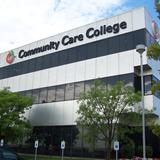- Tulsa Community College has served Tulsa and the surrounding community since 1970. The largest two-year college in Oklahoma, TCC serves approximately 30,000 students per semester in credit and continuing education classes. TCC operates four campuses and a conference center situated strategically throughout the Tulsa metropolitan area with an annual budget of approximately $84 million. The College employs 2,712 people, including 275 full-time faculty and 843 adjunct faculty. For the sixth consecutive year, TCC is ranked in the top three percent of more than 1,150 community colleges nationally in the number of associate degrees awarded in all disciplines.
School Highlights
Tulsa Community College serves 20,071 students (29% of students are full-time).
The college's student-teacher ratio of 15:1 is lower than the state community college average of 18:1.
Minority enrollment is 50% of the student body (majority Hispanic and Black), which is less than the state average of 56%.
Quick Facts (2026)
- Enrollment: 20,071 students
- In-state tuition: $2,820
- Out-state tuition: $7,610
- Student-teacher ratio: 15:1
- Minority enrollment: 50%
- Source: Integrated Postsecondary Education Data System (IPEDS)
Top Rankings
Tulsa Community College ranks among the top 20% of public schools in Oklahoma for:
Category
Attribute
Community Size
School Overview
The teacher population of 1,300 teachers has stayed relatively flat over five years.
Tulsa Community College
(OK) Community College Avg.
Carnegie Classification
Associate's Colleges: Mixed Transfer/Career & Technical-High Traditional
Baccalaureate/Associate's Colleges: Mixed Baccalaureate/Associate's
Institution Level
At least 2 but less than 4 years
At least 2 but less than 4 years
Institution Control
Public
Public
Total Faculty
1,300 staff
184 staff
School Calendar
Student Body
The student population of Tulsa Community College has grown by 28% over five years.
The student-teacher ratio of 15:1 has decreased from 34:1 over five years.
The Tulsa Community College diversity score of 0.70 is less than the state average of 0.76. The school's diversity has grown by 8% over five years.
Total Enrollment
20,071 students
1,856 students
Student-Teacher Ratio
15:1
18:1
# Full-Time Students
5,829 students
712 students
# Part-Time Students
14,242 students
1,144 students
# Enrollment Undergraduate
200 students
248 students
# Full-Time Undergraduate Students
5,829 students
663 students
# Full-Time Graduate Students
n/a
5 students
# Part-Time Undergraduate Students
14,242 students
1,058 students
# Part-Time Graduate Students
n/a
14 students
Total Dormitory Capacity
n/a
300 students
% American Indian/Alaskan
7%
8%
% Asian
5%
4%
% Hispanic
12%
11%
% Black
8%
10%
% White
50%
44%
% Hawaiian
n/a
8%
% Two or more races
13%
10%
% Non Resident races
2%
1%
% Unknown races
2%
4%
Diversity Score
0.70
0.76
College Completion Rate (Students who graduate in less than 4 years)
24%
54%
College Completion Rate (Students who graduate in 4 years or more than 4 years)
n/a
15%
Average Graduate Earnings (10 Years)
$35,500
$34,700
Tuition and Acceptance Rate
The public in-state tuition of $2,820 is less than the state average of $3,475. The in-state tuition has declined by 18% over four years.
The public out-state tuition of $7,610 is less than the state average of $7,963. The out-state tuition has declined by 13% over four years.
In-State Tuition Fees
$2,820
$3,475
Out-State Tuition Fees
$7,610
$7,963
% Students Receiving Some Financial Aid
82%
88%
Median Debt for Graduates
$13,000
$11,000
Median Debt for Dropouts
$6,535
$5,637
Acceptance Rate
n/a
55%
SAT Reading
n/a
387
SAT Math
n/a
475
ACT Composite
n/a
18
ACT English
n/a
17
ACT Math
n/a
18
Source: 2024 (or latest year available) Integrated Postsecondary Education Data System (IPEDS) , School Administrators
School Notes
- Since its inception, TCC has established a tradition of offering students a personal approach to higher education, an education that is designed to be practical and useful. You'll find incredible academic quality at a reasonable cost at TCC, and a qualified, dedicated faculty willing to work within your busy schedule. The college offers academic excellence, flexibility and convenience in scheduling, a state-of-the-art teaching environment. Tulsa Community College awards three degrees -- Associate in Arts, Associate in Science, and Associate in Applied Science, as well as a variety of certificates of achievement -- all based on the completion of our rigorous academic programs. Tulsa Community College offers programs at our Metro, Northeast, Southeast, or West campus. You'll complete an associate degree program -- with the option for transferring to a senior institution to complete your bachelor's degree. We also provide specialized instruction in workforce development programs, and continuing education for your job-training needs.
Frequently Asked Questions
How much does Tulsa Community College cost?
Tulsa Community College's tuition is approximately $2,820 for In-State students and $7,610 for Out-State students.
What schools are Tulsa Community College often compared to?
Tulsa Community Collegeis often viewed alongside schools like Oklahoma City Community College by visitors of our site.
What is Tulsa Community College's ranking?
Tulsa Community College ranks among the top 20% of community college in Oklahoma for: Largest student body.
Recent Articles

Community College vs. Bootcamps for Tech Careers in 2026
Community college vs. bootcamps in 2026. Compare cost, outcomes, credentials, and hiring trends to choose the best tech career path.

How to Build a Class Schedule That Fits Your Life (Spring 2026)
Learn how to build a class schedule that fits your life with expert tips, updated strategies for Spring 2026, and practical planning tools for students and families.

Top 10 Jobs for Community College Graduates in 2026
Meta Description: Discover high-demand jobs for community college graduates, with current salary trends, costs, and career pathways.











